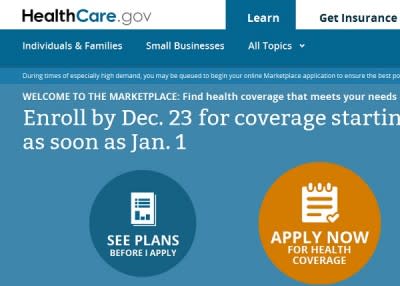Update: Federal courts split on key part of Obamacare funding
Two federal courts issued conflicting rulings today on a key section of the Affordable Care Act, or Obamacare, that provides tax subsidies in 34 states, possibly sending the cases to the Supreme Court at some point.
First, a split D.C. Circuit Court of Appeals struck down tax subsidies in 34 states that have federally run health exchanges in the case of Halbig v. Burwell.
Link: Read The Court’s Decision
But later in day, another federal court ruled in favor of the Obamacare subsidies. The United States Court of Appeals for the Fourth Circuit, in Richmond, said the Internal Revenue Service rule at the center of the controversy is “a permissible exercise of the agency’s discretion.”
The three-judge Fourth Circuit panel said ambiguity in the ACA’s language allowed tax subsidies to be given to people enrolled in state and federal exchanges.
Link: Fourth Circuit Ruling
That language contradicted the D.C. Circuit Court of Appeals opinion.
“Because we conclude that the ACA unambiguously restricts the section 36B subsidy to insurance purchased on Exchanges ‘established by the State,’ we reverse the district court and vacate the IRS’s regulation,” said Judge Thomas B. Griffith, writing in the 2-1 decision for the D.C. Circuit Court of Appeals.
“This case is about Appellants’ not-so-veiled attempt to gut the Patient Protection and Affordable Care Act,” said Judge Harry Edwards in his dissent.
“Because the proposed judgment of the majority defies the will of Congress and the permissible interpretations of the agencies to whom Congress has delegated the authority to interpret and enforce the terms of the ACA, I dissent.”
After the partisan fallout from the Supreme Court’s Obamacare ruling in 2012, governors and legislatures in the 34 states involved in the cases decided to pass on setting up their own health-care exchanges, and opted to let the federal government set them up instead.
Obamacare opponents have argued that a strict reading of the Affordable Care Act’s language says that only people in state-run health-care exchanges can qualify for the Obamacare tax breaks. If the language had been interpreted properly, they said, they also would have ineligible for the individual mandate tax penalty because of their income levels.
The Obama administration argued that an Internal Revenue Service ruling made it clear that the tax credits apply to states that have federally run insurance exchanges.
The cases are focused on a single sentence in the Affordable Care Act law. Section 1311 states that the federal government will give tax subsidies to eligible consumers who buy insurance from an exchange “established by the State.”
Regardless of the D.C. court’s opinion, the Halbig case had been expected to be appealed. But with another federal court in open disagreement, the odds have grown that the case will be headed to the Supreme Court at some point.
Recent Stories on Constitution Daily
The Scopes Monkey trial and the Constitution
The constitutional debate over parental rights: A missed opportunity
10 fascinating facts about the most famous scene in legal history



